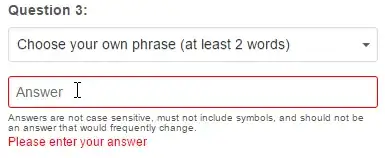Usual process
There are two common ways to implement the so-called "security question" (which I don't think to be very secure anyway, but that's another subject):
- Propose the user to choose a question from a set of already defined questions,
- Propose the user to type his own question.
The issue with the first possibility is that you will have a very large ratio of your users who will reuse the very same question like their first pet's name, for instance. This can be a weakness since an attacker can, with this example, use a dictionary of common pet names against all users who chose this question.
With the second possibility, you just encourage your users to use different questions. While the risk here is that they may use even weaker question, at least there will be a wider range of different questions making any automation attempts a bit more difficult for the attacker.
However, in both cases the question remains public, only the answer is secret. When you click on the "I forgot my password" link, in any of these situations you will be prompted with your question (either the one you've chosen or the one you typed) and will have to provide the correct answer to get back your access.
If you encounter a website requiring you to type both your question and answer during the password reset procedure, then you can bet that this process has been designed by someone a bit screwy (and that this process will most probably be changed quickly when the support department gets fed up with users' complaints).
Screenshot's specific case
The goal of any authentication system is to let you prove your identity in some way. The most quick one is by using a secret password, or in another word a secret shared between you and the service to which you would like to prove your identity.
If you forget such shared secret, then comes the security question(s): they will offer you an alternative way to prove your identity by giving some details regarding your personal life that (hopefully) only you may now.
Having a question asking again for a shared secret seems just plain useless, as it does not provide any alternative way to prove your identity: if you have lost your main shared secret, most chances are that your have lost this other one too.
So I would definitively class this one in the "screwy" category.
